Special Services Department

Staff Contact Information
Dr. Laura Simmons, Director, lsimmons@anderson4.org, (864) 403-2025
Crystal Bays, Administrative Assistant, cbays@anderson4.org, (864) 403-2024
Gail Elrod, Medicaid Specialist, gelrod@anderson4.org, (864) 403- 2064

Anderson 4 was named the Robokind Rockstar District for the 2022-23 school year! We are doing great things for our students!!
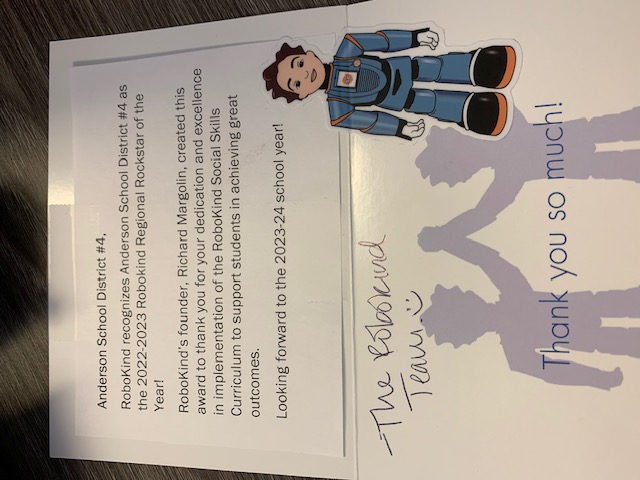
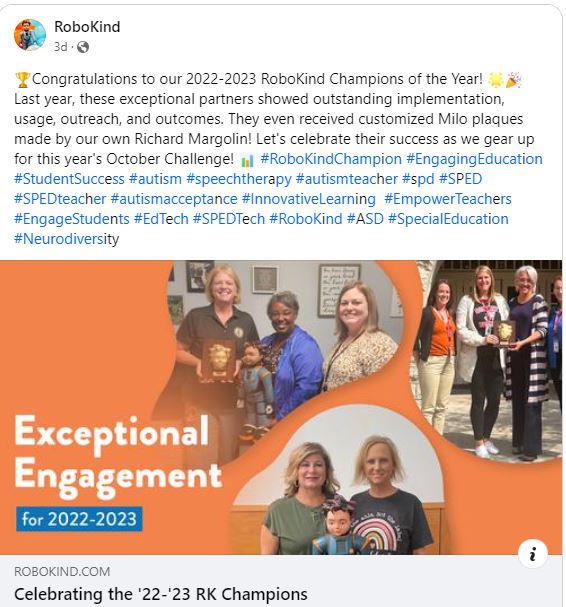

Individuals With Disabilities Education Act (IDEA)
The Individuals with Disabilities Education Act (IDEA) is a federal law ensuring services to children with disabilities throughout the nation. IDEA governs how states and public agencies provide early intervention, special education and related services to more than 6.5 million eligible infants, toddlers, children and youth with disabilities.
The Individuals with Disabilities Education Act (IDEA) contains a Child Find mandate that requires local educational agencies (LEAs) to seek out students who are potentially eligible under the IDEA and refer those students for an evaluation. Per the IDEA regulations at 34 CFR § 300.111, South Carolina has a continuing Child Find procedure in place to locate all children with disabilities residing in the State, including children with disabilities attending private schools and homeschool programs, regardless of the severity of their disability, and who are in need of special education and related services. This effort also includes highly mobile children with disabilities (such as migrant and homeless children) and children who are suspected of being a child with a disability and in need of special education, even though they are advancing from grade to grade. The purpose of this procedure is to ensure that a free appropriate public education (FAPE) is made available to all eligible students with disabilities.
The IDEA’s Child Find requirements permit referrals from any source who believes a child may be eligible for special education and related services. Any source includes, but is not limited to, a parent, teacher, health care provider, or other individual with knowledge about the child. To make Child Find effective, it is important that LEAs work cooperatively with the medical community and agencies providing services to children, including health departments, social service agencies, local management entities for mental health, developmental disabilities and substance abuse services, and children’s developmental service agencies. Other community programs should also be involved such as area services for the blind and the deaf, childcare programs, developmental day centers, Head Start programs and private/parochial schools.
To learn more about IDEA:
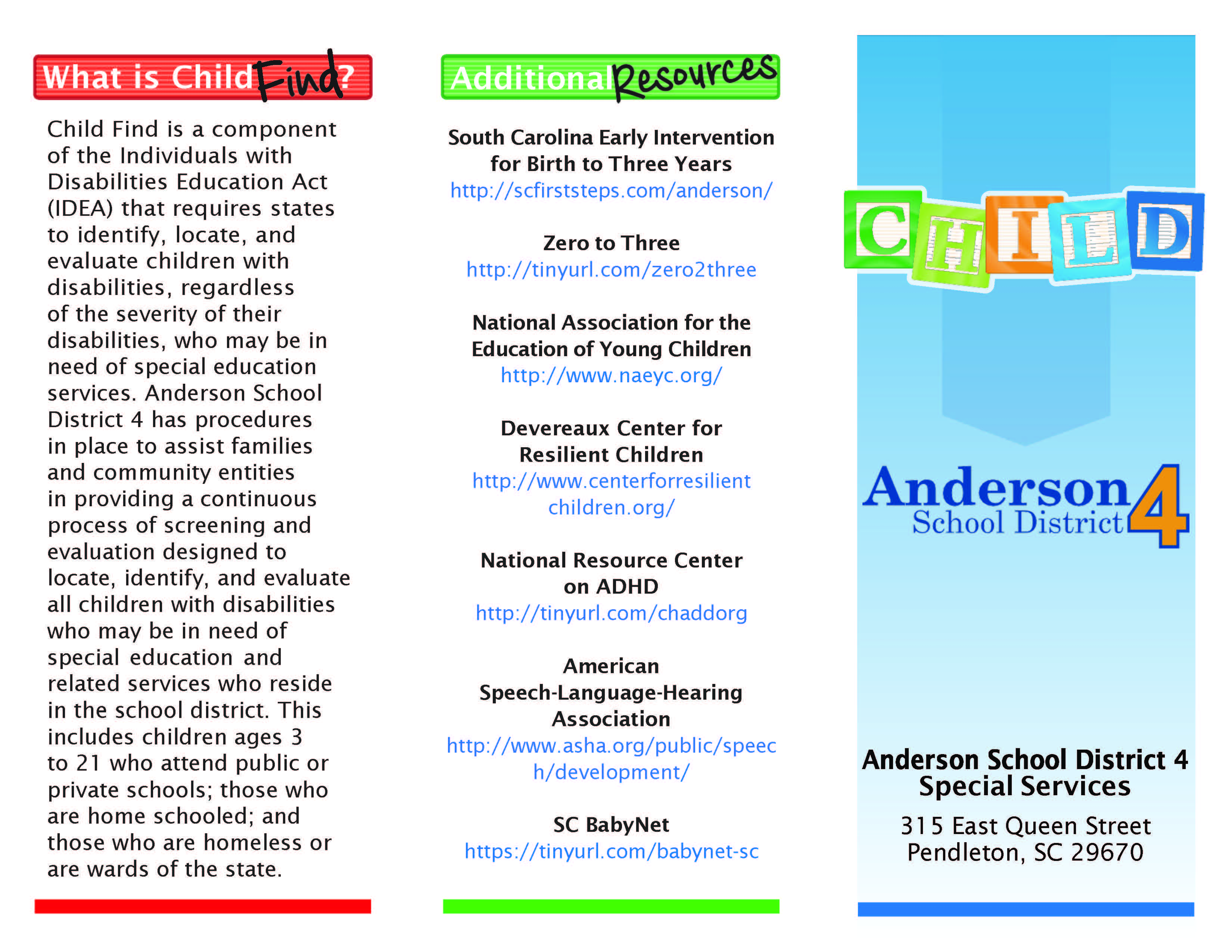
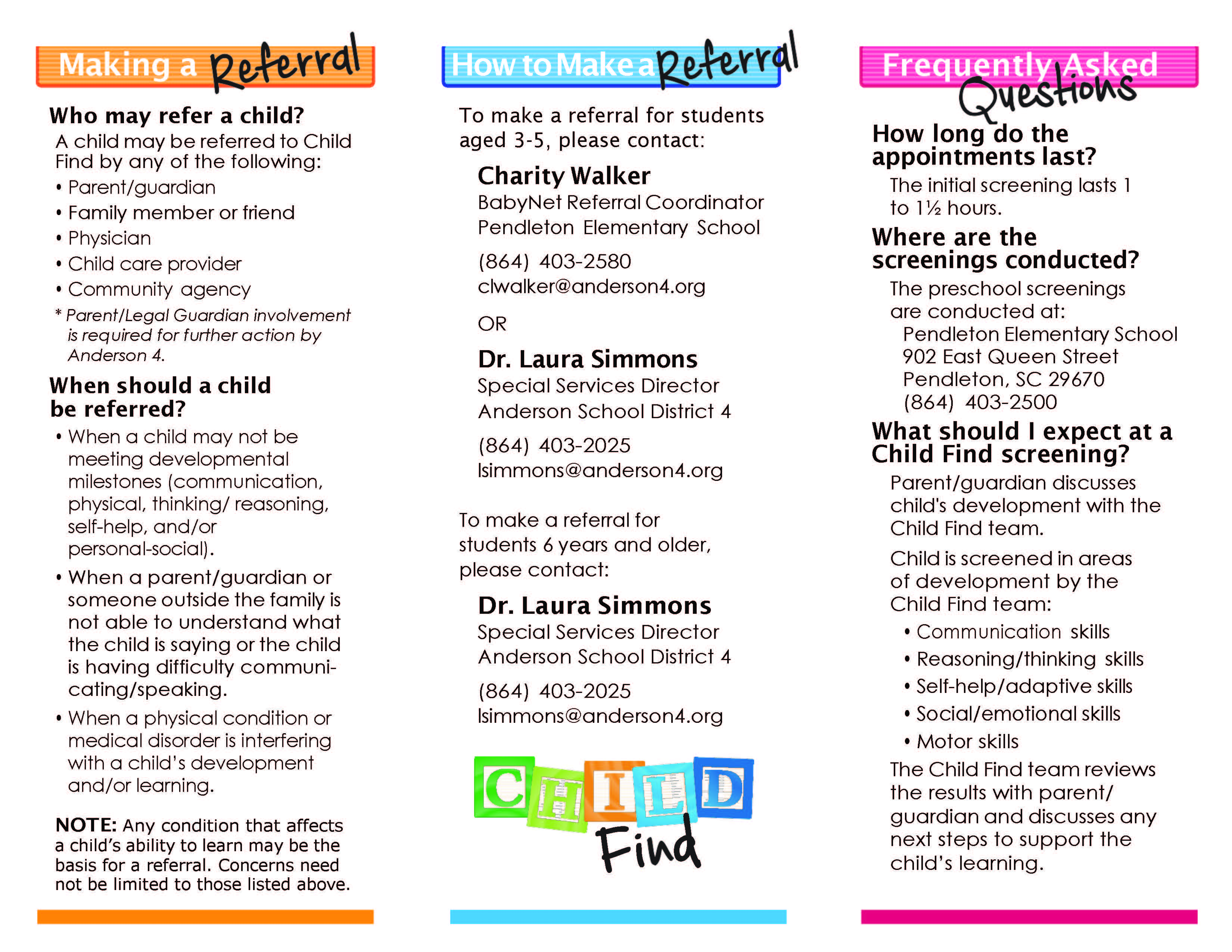
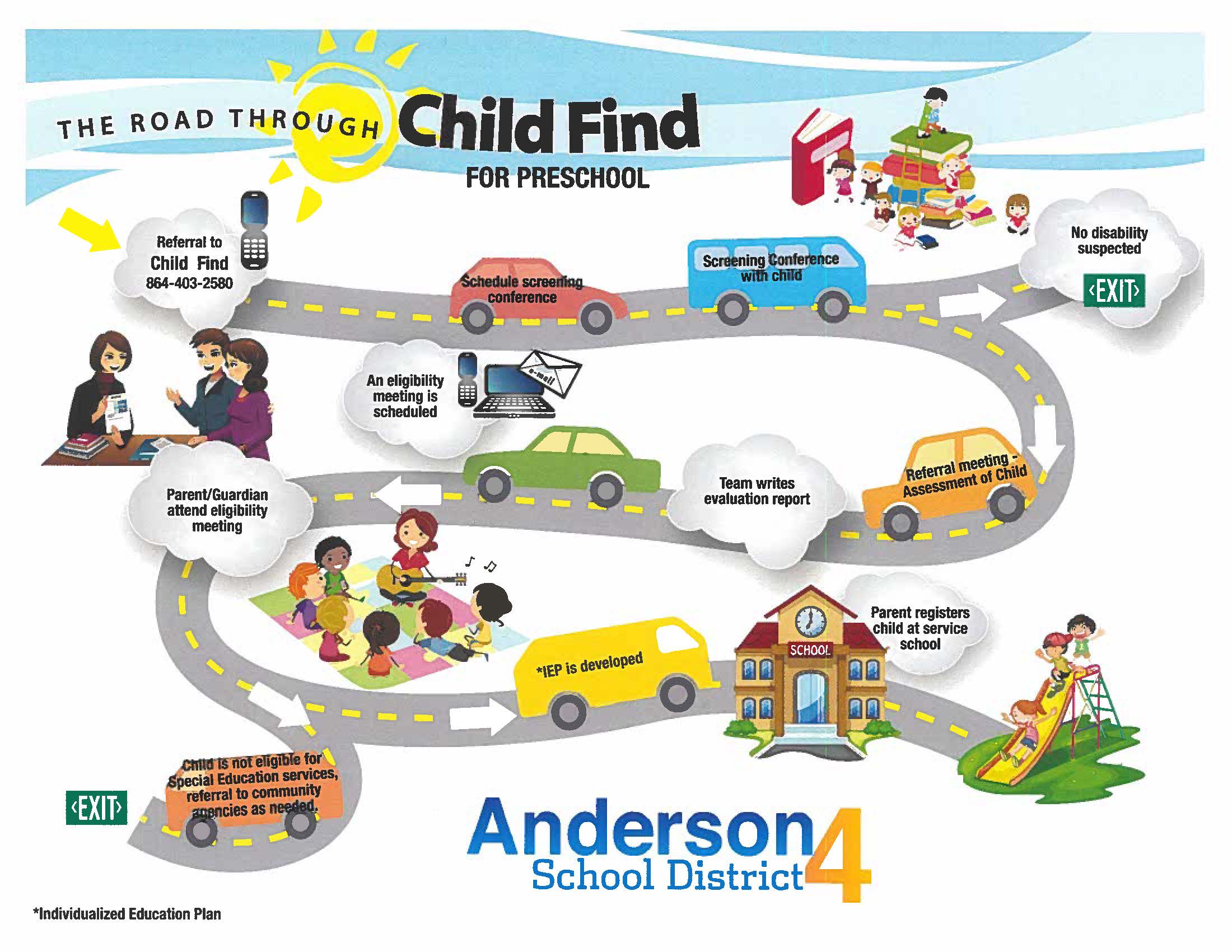
Multilingual Learner Program
The screening process for qualifying for ML services is as follows:
All new students are given a home language survey. Students from a primary or home language other than English are assessed for English language proficiency by a qualified staff member. Students who test at limited fluency on a standardized test for ML skills are eligible for ML services and are also monitored in their other coursework.
Students who test as English proficient upon initial assessment do not receive services but are monitored in their regular coursework to ensure their academic success.
Students may stop receiving ML services under three conditions:
(1)The student has demonstrated grade-level performance in English proficiency testing and class performance. (2)Other strategies and tests have shown that the student has reached his/her level of capability and has learning difficulties best addressed through other programs. (3)The parents/guardians have requested that their child be removed from the ML instructional program and have signed a waiver (updated yearly) to that end.
Students may exit the ML program under the following conditions:
Each spring, all students served or monitored by the ML program must take the state’s WIDA test to demonstrate their mastery of English. According to current state law, students must pass the WIDA test with a composite score of 5 (fluent) two years in a row. Doing so will exempt the student from taking the WIDA in subsequent years. The ML department will continue to monitor the student's progress for two years after he/she has scored fluent to ensure no language issues arise. If needed, a student can be pulled back into ML classes if this is judged best by teachers, administrators and parents.
Once the two years of further monitoring have passed and the student is progressing well in coursework and has passed state tests with satisfactory scores, the student will be fully exited from the ML program.
If you have specific questions regarding multilingual learners please feel free to reach out to the following:
Elementary: Sharon Jackson
Secondary: Rachael Cox
District: Dr. Laura Simmons
To learn more visit:
South Carolina Title III Multilingual Learners and Immigrant Students Program
Medical Homebound
To be considered for medical homebound instruction, students must anticipate or have a minimum of 10 consecutive absences (elementary and middle school) or 5 consecutive absences (high school) due to illness, accident, or pregnancy. The student, parent, or guardian should contact the school counselor within the first few days of being absent to inquire about medical homebound services. Prior to being approved for medical homebound services, the student is still responsible for obtaining make up work from his/her teachers while awaiting approval for instructional services. Medical homebound instruction is not guaranteed once a medical professional completes the required form, the District has the right to approve and/or deny medical homebound services.
“South Carolina's mandates regarding medical homebound instruction appear in State Board of Education Regulation 43-241.Specifically, Regulation 43-24 says that students who cannot attend public school because of illness, accident, or pregnancy, even with the aid of transportation, are eligible for medical homebound instruction. A physician must certify that the student is unable to attend school but may benefit from instruction given in the home. Any student participating in a program of medical homebound instruction must be approved by the district superintendent or designee on standardized forms provided by the State Department of Education. The district superintendent or his/her designee may approve or deny any student requesting homebound instruction.”
If you have questions or need more information, contact the following:
La France Elementary: Kelly Gossett
Mount Lebanon Elementary: Annie Mitchell
Pendleton Elementary: Kristy Tilley
Townville Elementary: Erin Toorie
Riverside Middle School: Jill McClain or Jeff Rae
Pendleton High School: Jennifer Ealey, Philip Young, Joey Branyon
District: Dr. Laura Simmons
To learn more about Medical Homebound:
Section 504 Of The Rehabilitation Act
Section 504 covers qualified students with disabilities who attend schools receiving Federal financial assistance. To be protected under Section 504, a student must be determined to: (1) have a physical or mental impairment that substantially limits one or more major life activities; or (2) have a record of such an impairment; or (3) be regarded as having such an impairment. Section 504 requires that school districts provide a free appropriate public education (FAPE) to qualified students in their jurisdictions who have a physical or mental impairment that substantially limits one or more major life activities.
The determination of whether a student has a physical or mental impairment that substantially limits a major life activity must be made on the basis of an individual inquiry. The Section 504 regulatory provision at 34 C.F.R. 104.3(j)(2)(i) defines a physical or mental impairment as any physiological disorder or condition, cosmetic disfigurement, or anatomical loss affecting one or more of the following body systems: neurological; musculoskeletal; special sense organs; respiratory, including speech organs; cardiovascular; reproductive; digestive; genito-urinary; hemic and lymphatic; skin; and endocrine; or any mental or psychological disorder, such as mental retardation, organic brain syndrome, emotional or mental illness, and specific learning disabilities. The regulatory provision does not set forth an exhaustive list of specific diseases and conditions that may constitute physical or mental impairments because of the difficulty of ensuring the comprehensiveness of such a list.
Major life activities, as defined in the Section 504 regulations at 34 C.F.R. 104.3(j)(2)(ii), include functions such as caring for one's self, performing manual tasks, walking, seeing, hearing, speaking, breathing, learning, and working. This list is not exhaustive. Other functions can be major life activities for purposes of Section 504. In the Amendments Act, Congress provided additional examples of general activities that are major life activities, including eating, sleeping, standing, lifting, bending, reading, concentrating, thinking, and communicating. Congress also provided a non-exhaustive list of examples of “major bodily functions” that are major life activities, such as the functions of the immune system, normal cell growth, digestive, bowel, bladder, neurological, brain, respiratory, circulatory, endocrine, and reproductive functions.
To get specific information about 504 and how it may relate to your child, contact the 504 Chair at your child’s school:
Pendleton High School: Dr. Valerie Ayres
Riverside Middle School: Jill McClain
LaFrance Elementary School: Melida Reeves
Mount Lebanon Elementary School: Elliott Southard
Pendleton Elementary School: Kristy Tilley
Townville Elementary School: Erin Toore
District 504 Coordinator: Dr. Laura Simmons
To learn more about Section 504 :
Curriculum Support
Click a button below to learn more about our instructional programs utilized across the district!
Parent Resources
Click a button below for additional resources!

